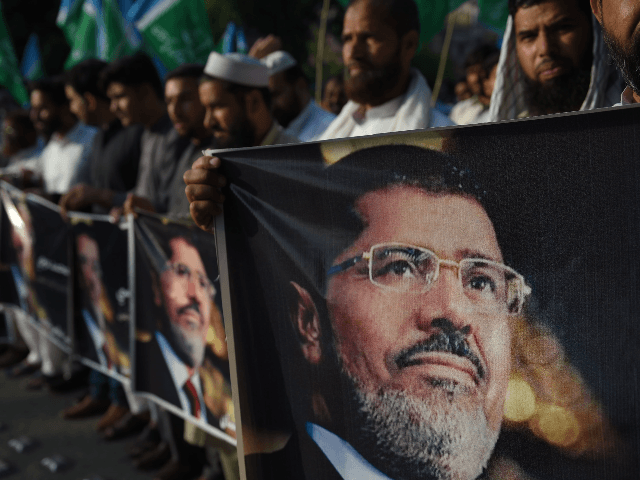The Egyptian government on Wednesday denounced the United Nations for allegedly seeking to “politicize” the death this week of the former President Mohamed Morsi by calling for an “independent inquiry” into the demise of the prominent leader of the terror-linked Muslim Brotherhood (MB) group.
Morsi died of a heart attack while facing espionage charges during a court hearing on Monday, according to Egyptian state media.
Ahmed Hafez, a spokesman for Egypt’s foreign ministry, said that President Abdel Fattah el-Sisi’s administration condemned “in the strongest terms” the call by a spokesperson for the U.N High Commissioner for an independent investigation into Morsi’s death, the Agence France-Presse (AFP) news agency reported Wednesday.
Hafez accused the U.N. of engaging into a “deliberate attempt to politicize a case of natural death.”
Rupert Colville, a spokesperson for the U.N. High Commissioner for Human Rights, called for an independent investigation into the death of Egypt’s first democratically elected president, Morsi.
Echoing the non-governmental organization (NGO) Amnesty International in a Twitter post on Tuesday, the U.N. human rights office declared, “There must be a thorough independent inquiry into the circumstances of former President #Morsi’s death.”
#Egypt: There must be a thorough independent inquiry into the circumstances of former President #Morsi's death, incl. conditions of detention. The State is responsible for ensuring he was treated humanely and that his right to life & health were respected: https://t.co/eDwqoLTulG pic.twitter.com/i3oWwQeVHM
— UN Human Rights (@UNHumanRights) June 18, 2019
Colville further argued in a statement issued Tuesday :
[T]he [Egyptian] State is responsible for ensuring [Morsi] was treated humanely and that his right to life and health were respected. Any sudden death in custody must be followed by a prompt, impartial, thorough, and transparent investigation carried out by an independent body to clarify the cause of death.
…
Concerns have been raised regarding the conditions of Mr. Morsi’s detention, including access to adequate medical care, as well as sufficient access to his lawyers and family, during his nearly six years in custody. He also appears to have been held in prolonged solitary confinement. The investigation should, therefore, also encompass all aspects of the authorities’ treatment of Mr. Morsi to examine whether the conditions of his detention had an impact on his death.
In his previous role as Egypt’s military chief, sitting President Sisi led the protests that ultimately toppled Morsi in July 2013 for allegedly trying to turn the North African country into a Muslim Brotherhood-compliant Islamist state.
According to internal documents made public, MB, which originated in Egypt in 1928, is seeking to change existing governments and societies from within to establish a global caliphate.
Following the coup, Morsi spent six years in prison on a range of charges including spying and organizing a prison break during the 2011 rebellion. Egyptian authorities sentenced him to death in 2015 over his alleged role in the prison break.
Since Morsi’s removal, Sisi has won two presidential elections. Critics have accused him of abusing his authority to wage a crackdown on dissent, namely thousands of individuals linked to the Muslim Brotherhood.
The Wall Street Journal described Morsi’s presidency as the “highest pinnacle” reached by the Muslim Brotherhood, which Egyptian authorities have deemed a terrorist group.
In addition to Egypt, Russia and Muslim-majority Saudi Arabia, the United Arab Emirates (UAE), and Bahrain have outlawed MB.
U.S. President Donald Trump’s administration is weighing labeling MB a terrorist organization.
Soon after news of Morsi’s death surfaced on Monday, Amnesty International also called for an “immediate investigation” into the circumstances surrounding his demise.
Citing his family, Amnesty noted that Egyptian authorities heavily restricted Morsi’s ability to communicate with the outside world.
As a result, the human rights group argued, “Little is known about his exact conditions of detention.”
Magdalena Mughrabi, the deputy director at Amnesty for the Middle East and North Africa, accused the Sisi administration of torturing Morsi by keeping him in solitary confinement.
Such conditions placed “a considerable strain on his mental and physical wellbeing and violating the absolute prohibition against torture and other ill-treatment under international law,” she wrote in a statement.
Consistent with the position of the Muslim Brotherhood, Turkish President Recep Tayyip Erdogan claimed that Morsi did not die of natural causes.
“Mohammed Morsi walked to join God during the trial. Whether this was a normal walk or were there some other conditions involved, this is something to think about,” the Turkish president proclaimed, according to AFP.
Erdogan praised Morsi as “a martyr who died struggling for his cause,” Turkey’s state-run Anadolu Agency (AA) reported Tuesday.
Turkey’s ruling Justice and Development (AKP) party is considered an MB affiliate.
The Muslim Brotherhood went as far as accusing Egypt of assassinating Morsi.
Mohammed Sudan, a London-based prominent member of the Islamist group, described Morsi’s demise as “premeditated murder,” Al Jazeera reported Tuesday.
In a statement, the Brotherhood’s Freedom and Justice political party blamed Egyptian authorities for Morsi’s “deliberate slow death,” Al Jazeera added.
AFP noted:
Morsi was buried under heavy security early on Tuesday. His family attended funeral prayers in the mosque of Cairo’s Tora prison, followed by the burial at a cemetery in the Egyptian capital’s eastern district of Nasr City.
Morsi’s son Ahmed said security agencies refused to allow Morsi to be buried at the family’s cemetery in his hometown of Adwa in Sharqia province, and instead had him interred at a Cairo cemetery dedicated to prominent Islamists.
The U.S.-designated Palestinian group Hamas, considered an MB offshoot, and Islamist leaders from several countries, including some that house Muslim Brotherhood activities, mourned Morsi’s death.

COMMENTS
Please let us know if you're having issues with commenting.